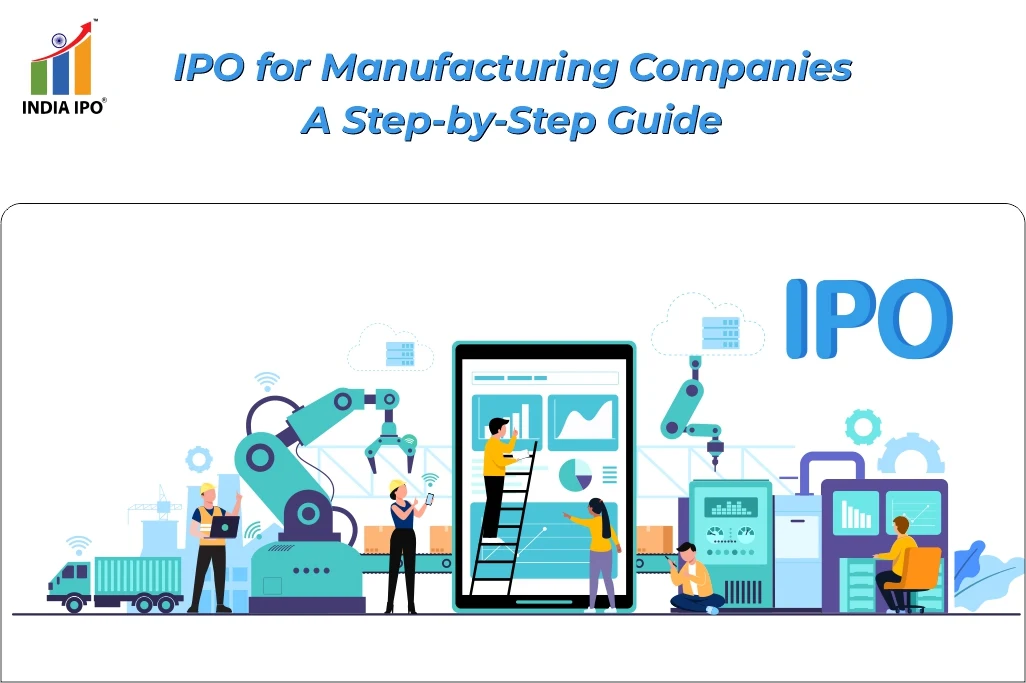IPO for Manufacturing Companies – A Step-by-Step Guide
Introduction
In the Indian economy, large companies often dominate headlines, but there is one underrated sector — SMEs (Small and Medium Enterprises). SMEs contribute 30.1% to GDP, 35.4% to industrial production, and 45.73% to exports. They also employ over 26.77 crore people, roughly 40% of the total workforce.
The SME sector began its growth in the 1950s when the government encouraged small industries to balance economic development and employment. For SMEs, an IPO is not just fundraising but also a tool for credibility, capital, and brand recognition. Over the past 20+ years, manufacturing SMEs have shown steady growth through innovation and global market participation.
Why Should Manufacturing Companies Consider an IPO?
When a manufacturing company issues an IPO, it transitions from private to public ownership, raising sustainable capital for expansion, production, and debt repayment.
Importance of manufacturing IPOs:
- • Generate Funding: Raises long-term funds and reduces financial dependency.
- • Expansion and Modernization: Funds can be used to expand, upgrade technology, and improve efficiency.
- • Debt Reduction: Helps repay debts, improving financial stability.
- • Investment in New Equipment: Enables investment in R&D, equipment, and process improvements.
- • Enhanced Market Credibility: Builds trust through financial transparency and compliance.
- • Increased Growth Opportunities: Opens doors to strategic partnerships and global visibility.
Understanding Industrial SME IPOs
An Industrial SME IPO is when a small or medium-sized manufacturing company sells shares to the public for the first time to raise capital and expand operations.
Eligibility criteria for SME IPOs:
- • Company Type: Must be a Public Limited Company under the Companies Act 2013.
- • Track Record: Should have 3–5 years of operational history.
- • Financial Performance: Must show profits and a stable financial record.
- • Post-Issue Capital: Should have paid-up capital between ₹1 crore – ₹25 crore after the IPO.
Pre-IPO Readiness for Manufacturing Companies
Pre-IPO readiness ensures financial, legal, and operational compliance before going public.
- • Audit and Accounting: Maintain clean, audited records for at least three years.
- • Legal Compliance: Follow all applicable laws and internal policies.
- • Formal Business Processes: Establish transparent and scalable operations.
- • Operational Readiness: Ensure complete supply chain documentation and supplier verification.
- • Strong Management Team: Build a leadership team with defined roles and responsibilities.
Step-by-Step Process of IPO for Factories and Industrial SMEs
-
• Appoint Merchant Banker & Advisor: Hire SEBI-registered professionals to guide the IPO process.
- • Due Diligence & Drafting of DRHP: Conduct financial and legal audits for transparency.
- • Regulatory Approvals: File DRHP and obtain approvals from SEBI or stock exchanges.
- • IPO Marketing & Roadshows: Promote the IPO among potential investors.
- • Public Offering & Allotment: Allocate shares and handle oversubscriptions transparently.
- • Listing on SME Platform: Begin public trading on BSE SME or NSE Emerge.
Key Benefits of IPO for Manufacturing SMEs
Common Challenges Faced by Manufacturing Companies
-
• Complex Supply Chain Management: Managing parts, materials, and timely distribution.
- • Operational Scaling: Adapting to production and legal requirements during IPO preparation.
- • High Capital Requirements: Maintaining equipment and facilities demands heavy investment.
- • Meeting Investor Expectations: Balancing profitability and shareholder confidence.
- • Market Timing: Choosing the right time to launch an IPO for maximum participation.
How India IPO Assists Manufacturing Companies
India IPO acts as a trusted partner for manufacturing companies, providing expert support for a smooth and compliant IPO journey.
Conclusion
The IPO journey for manufacturing companies marks a major shift from private to public growth. It provides funds, transparency, and credibility, fueling expansion and long-term success. With the right consultancy, such as India IPO, companies can ensure a strategic, compliant, and successful IPO experience.
Read more :
Frequently asked Questions (FAQs )



